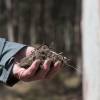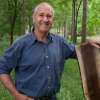
A long view: Evan Rolley reflects on five decades in the forestry sector
Posted 25 January 2024
Former Private Forests Tasmania Chair Evan Rolley penned a reflection on his 50-year career working in the Tasmanian and national forestry industry.
Mr Rolley's tenure with PFT ended on January 23.
Looking out to the south across our farm to the towering 30-metre Blue gums we planted 30 years ago, time and landscape change is captured in their growth. A woodland habitat established with understorey Blackwoods and musk that beat the rabbits, wallaby, possums, drought and strong southerly winds. These plantings on our farm frame part of a practical response to climate change and a move to more sustainable agricultural landscapes that I now see regularly being rolled out by farming families around Tasmania. Five decades ago, there was very little of this whole farm planning in practice. Thirty years ago, as a Commissioner for Private Forests the challenges were implementing the frameworks for the first comprehensive forest practices code and encouraging farmers to adopt a commitment to sustainable forestry through Private Timber Reserves. The opportunity to Chair Private Forests over the past six years has seen more positives for private forestry in the rapidly evolving agricultural landscape. New State-wide irrigation schemes, stronger markets for many farm products and rapidly rising land values are strongly influencing the landscape and patterns of commercial farming enterprises. Thinking of trees as fundamental farm infrastructure and not as opportunity to roll out tree farms to the exclusion of other farming enterprises is leading to a more integrated approach on farms and is helping drive higher farm value. Launching the Tree Alliance and seeing at first hand the commitment and energy of farmers from the Sisters Hills, Midlands, Derwent Valley and Tasman Peninsula to more integrated tree planting endeavours shows a way forward. The value of these different patterns of tree plantings to benefit farm and stock shelter, moisture and soil conservation, habitat and timber is clear to see. Seeing is believing and will influence neighbours' behaviour in the progressive way that ideas work in rural communities. Along the way we have also seen an improved understanding of the value proposition of Private Forests Tasmania as a leader in supporting more sustainable land management practices. The policy work in rolling out more positive approaches in water rules for plantations, carbon farming rules, industry safety codes and fire management initiatives improve the whole economy. Infrastructure at the Parattah railhead with repurposed repaid private forestry softwood loans gets logs onto rail in the south east of Tasmania more efficiently and halves the transport costs compared to road. This offers up new commercial opportunities for private landowners in the south to commit to longer term forestry investments. Getting the peer reviewed science on managing private regrowth native forests under selective harvesting and regeneration approaches communicated widely opens up new potential volumes of locally grown wood products. This is a carbon positive initiative and will help meet the need for building materials for more local housing. At the centre of all these new approaches is a small committed, professional team of Private Forest Tasmania workers and a creative, talented Board focused on finding new strategies for growing private forestry. Well done to all the farmers, foresters, planting and harvesting contractors, wood processors and believers in the private forests sector who are managing the landscape with good science and belief in the future. Remember that carbon is being stored in the most natural and cost-effective way via photosynthesis, the use of wood products from harvested trees and the replanting for ongoing sustainability. Let there be much more of all of this in private forestry to benefit the whole community. |





